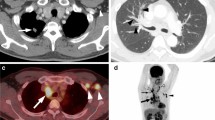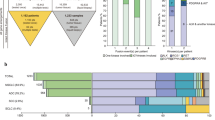Abstract
Through an integrated molecular- and histopathology-based screening system, we performed a screening for fusions of anaplastic lymphoma kinase (ALK) and c-ros oncogene 1, receptor tyrosine kinase (ROS1) in 1,529 lung cancers and identified 44 ALK-fusion–positive and 13 ROS1-fusion–positive adenocarcinomas, including for unidentified fusion partners for ROS1. In addition, we discovered previously unidentified kinase fusions that may be promising for molecular-targeted therapy, kinesin family member 5B (KIF5B)-ret proto-oncogene (RET) and coiled-coil domain containing 6 (CCDC6)-RET, in 14 adenocarcinomas. A multivariate analysis of 1,116 adenocarcinomas containing these 71 kinase-fusion–positive adenocarcinomas identified four independent factors that are indicators of poor prognosis: age ≥50 years, male sex, high pathological stage and negative kinase-fusion status.
This is a preview of subscription content, access via your institution
Access options
Subscribe to this journal
Receive 12 print issues and online access
$209.00 per year
only $17.42 per issue
Buy this article
- Purchase on Springer Link
- Instant access to full article PDF
Prices may be subject to local taxes which are calculated during checkout


Similar content being viewed by others
References
Soda, M. et al. Nature 448, 561–566 (2007).
Takeuchi, K. et al. Clin. Cancer Res. 14, 6618–6624 (2008).
Takeuchi, K. et al. Clin. Cancer Res. 15, 3143–3149 (2009).
Rikova, K. et al. Cell 131, 1190–1203 (2007).
Takeuchi, K. et al. Haematologica 96, 464–467 (2011).
Takeuchi, K. et al. Clin. Cancer Res. 17, 3341–3348 (2011).
Sugawara, E. et al. published online, doi:10.1002/cncr.27391 (17 January 2012).
Choi, Y.L. et al. Cancer Res. 68, 4971–4976 (2008).
Inamura, K. et al. J. Thorac. Oncol. 3, 13–17 (2008).
Takeuchi, K. Pathol. and Clin. Med. 28, 139–144 (2010).
Jokoji, R. et al. J. Clin. Pathol. 63, 1066–1070 (2010).
Grieco, M. et al. Cell 60, 557–563 (1990).
Tognon, C. et al. Cancer Cell 2, 367–376 (2002).
Flanigan, J., Deshpande, H. & Gettinger, S. Biologics 4, 237–243 (2010).
Takahashi, M., Ritz, J. & Cooper, G.M. Cell 42, 581–588 (1985).
Ito, T. et al. Lancet 344, 259 (1994).
Hamatani, K. et al. Cancer Res. 68, 7176–7182 (2008).
Bounacer, A. et al. Oncogene 15, 1263–1273 (1997).
Kosaka, T. et al. Cancer Res. 64, 8919–8923 (2004).
Han, B. et al. Cancer Res. 68, 7629–7637 (2008).
Acknowledgements
We thank M. Iwakoshi, K. Shiozawa, T. Kakita, H. Nagano and K. Nomura for their technical assistance and S. Sengoku for providing administrative assistance. This work was supported in part by Grants-in-Aid for Scientific Research from the Ministry of Education, Culture, Sports, Science and Technology of Japan, as well as by grants from the Japan Society for the Promotion of Science; the Ministry of Health, Labor and Welfare of Japan; the Vehicle Racing Commemorative Foundation of Japan; the Princess Takamatsu Cancer Research Fund; and the Uehara Memorial Foundation.
Author information
Authors and Affiliations
Contributions
K.T. conceived of and led the entire project, designed the FISH probes, screened samples using FISH and immunohistochemistry, performed histopathological analyses, generated figures and tables and wrote the manuscript. M.S. performed functional analyses and generated the figures. Y.T. performed inverse RT-PCR and RACE experiments and their corresponding analyses. R.S. conducted statistical analyses. S.S. performed FISH and histopathological analyses. S.H. processed and analyzed the tissue microarrays and FISH screening and generated figures. R.A. processed the FISH probe library. W.H. made and analyzed the database and processed tissue microarrays. H.N., H.U., Y.S., S.O. and K.N. collected specimens and clinical information and were involved in planning the project. Y.L.C. conducted functional analyses. H.M. supervised the functional analyses and planned the project. Y.I. performed histopathological analyses and collected specimens. All authors participated in the discussion and interpretation of the data and the results.
Corresponding author
Ethics declarations
Competing interests
The authors declare no competing financial interests.
Supplementary information
Supplementary Text and Figures
Supplementary Figures 1–7, Supplementary Tables 1–4, Supplementary Methods and Supplementary Appendix (PDF 4701 kb)
Rights and permissions
About this article
Cite this article
Takeuchi, K., Soda, M., Togashi, Y. et al. RET, ROS1 and ALK fusions in lung cancer. Nat Med 18, 378–381 (2012). https://doi.org/10.1038/nm.2658
Received:
Accepted:
Published:
Issue Date:
DOI: https://doi.org/10.1038/nm.2658
This article is cited by
-
Oncogenic alterations in advanced NSCLC: a molecular super-highway
Biomarker Research (2024)
-
Anaplastic lymphoma kinase overexpression enhances aggressive phenotypic characteristics of endometrial carcinoma
BMC Cancer (2023)
-
The role of m6A methylation in therapy resistance in cancer
Molecular Cancer (2023)
-
RET signaling in breast cancer therapeutic resistance and metastasis
Breast Cancer Research (2023)
-
Recent advances in non-small cell lung cancer targeted therapy; an update review
Cancer Cell International (2023)



